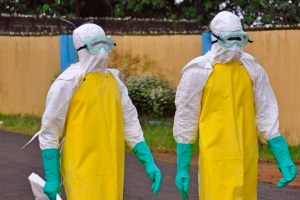The current outbreak of the precarious Ebola Virus Disease (EVD) is the deadliest in its history since it first appeared in 1976 in two simultaneous outbreaks, one in Nzara, Sudan, and the other in Yambuku, Democratic Republic of Congo (which occurred in a village near the Ebola River, from which the disease takes its name). The haemorrhagic fever has left about 2,800 deaths in its wake since its outbreak in Guinea, and then spread across land boarders to Sierra Leone and Liberia. It later found its way into Nigeria through the infamous Liberian American, Patrick Sawyer, who threw maelstrom into the most populous black nation and sparked a global alertness for the deadly Ebola virus. In Nigeria, the virus left about 7 people dead and a host of others were quarantined and monitored for some weeks before they were declared free or cured of the virus. Thankfully, EVD is being contained in Nigeria and the World Health Organization (WHO) has commended the Nigerian government for its efforts in that regard.
Sadly, not the same can be said for other African countries like Guinea, Sierra Leone and Liberia where the menace of the virus is more felt due to poor health systems. It has been reported by the Centers for Disease Control and Prevention in a report on Tuesday that the number of Ebola cases in Liberia and Sierra Leone could rise to between 550,000 and 1.4 million by January if there are no “additional interventions or changes in community behavior.” The estimate was gotten from a new forecasting tool developed by the CDC. The range of estimated cases from 550,000 to 1.4 million is wide because experts suspect the current count is grossly under-reported.
Since the epidemic of the EVD, there has been an outcry all over the world to arrest the situation and as you would expect, the UN has been spearheading that. The official death toll from Ebola in West Africa has climbed to more than 2,800 in six months, with 5,800 cases confirmed, according to the World Health Organization. The CDC however stressed that if 70% of people with Ebola are properly cared for in medical facilities, the epidemic could decrease and eventually end. More help is needed and organizations who care about the well-being of the human race are lending their weight, including The Fédération Internationale de Football Association.
FIFA, the world’s football governing body considers it necessary to work hand in hand with the UN in the fight against Ebola in Africa. They are responding to the requirements needed for curbing the dreaded virus as stated by Médecins Sans Frontières (Doctors Without Borders), which includes: treatment centers, isolation units, mobile laboratories, protective clothing and qualified personnel.
Monrovia’s Antoinette Tubman stadium which was donated by FIFA to the Liberia Football Association will be set up as a large-scale unit for Ebola treatment with two medical care centers within the premises. The World Health Organization (WHO) chose the football pitch because of its safety and effectiveness.
Special Adviser to the Secretary General of the United Nations on Sport for Peace and Development, Wilfred Lemke said “The Ebola outbreak also has a tremendous impact on the sport community, ranging from health threats to the athletes themselves and restrictions of travel affecting competitions and the development of sport. National authorities, the UN and the world of sport need to work closely together in order to halt the spread of the disease. The commitment of sport organizations to support our efforts is very much welcomed and crucial. It is my hope that many will join in this fight. In particular I was very pleased to note FIFA’s pledge to support health-related measures by agreeing to cover potential damages to the football pitch of the Antoinette Tubman stadium in Monrovia, Liberia that has been earmarked for the use for Ebola treatment centers.”
Making the pitch available is not the only thing FIFA has agreed to do. They’ve also said that at their next Finance Committee meeting holding tomorrow September 25, they will propose to use resources from their solidarity fund to support member associations of affected countries (Sierra Leone, Liberia and Guinea) in the offensive against Ebola. More financial support will also be expended on solidarity with a local UN initiative.
Writing in his weekly column on THE FIFA WEEKLY, FIFA president Sepp Blatter had these parting words: “There are moments when results and tables fade into insignificance; moments when football is required to shoulder its social and community responsibilities and demonstrate its humanitarian side.” I share his sentiments too and I urge us all to look beyond our busy schedules and cleavages and lend a helping hand to someone out there who is in dire need. It may not be an Ebola patient of course, but there is something we all can do to start making the world a better place.
O.P. Philips is a freelance writer/entrepreneur. He is the author of The “OBAMA” in You! His new book, “What Football Teaches About Life” will be released soon.


